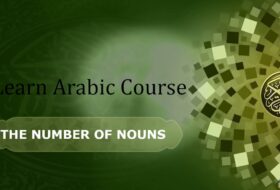Arabic pronouns part 2 الضمائر
Possessive Pronouns:
The word ( أيًا ) is prefixed to the Attached Pronouns. The word ( أيًا ) confines the meaning to ‘only/alone ( إِيَّاكَ نَعْبُدُ وَإِيَّاكَ نَسْتَعِينُ ) You (Alone) we worship, and You (Alone) we ask for help”[1/4]. For usage of Possessive Pronouns with ( أيًا ) see this Table:

Note:
Concentrate on the underlined forms only in the beginning, and skip over the remaining forms as these are not frequently used in the Holy Quran.
Demonstrative Pronouns (أسم الاشارة)
The demonstrative pronouns are listed below:

Note:
Concentrate on the underlined forms.
The Relative Pronouns ( ألاسم الموصول )
The relative pronouns (الذى – الذين ) etc. are used as conjunction, meaning ‘that, which, who, whom’. They serve the purpose of joining nouns/pronouns or verbs to other nouns or verbs. They have a definite form Like:

Examples:
- الولد الذى خرج من المسجد طالب The boy who went out of the Mosque is a student.
- الرجال الذى خرجوا من المسجد مدرسون The men who left the office are teachers.
- البنت التى خرجت من البيت طالبة ‘The girl who left the house is a student.
- هُوَ اللَّهُ الَّذِي لَا إِلَٰهَ إِلَّا هُوَ “He is Allah, beside Whom la Ilaha illa Howa (none has the right to be worshipped but He)”. [59/293]
Interrogative Pronouns ( أسماء الاستفهام )
These are given below:
-(من ) Who (ما) What (أين) Where (كيف) How (متى ) When (كم)How Much (لماذا) For What(ماذا) What (أنَى) Which (لم) Why













